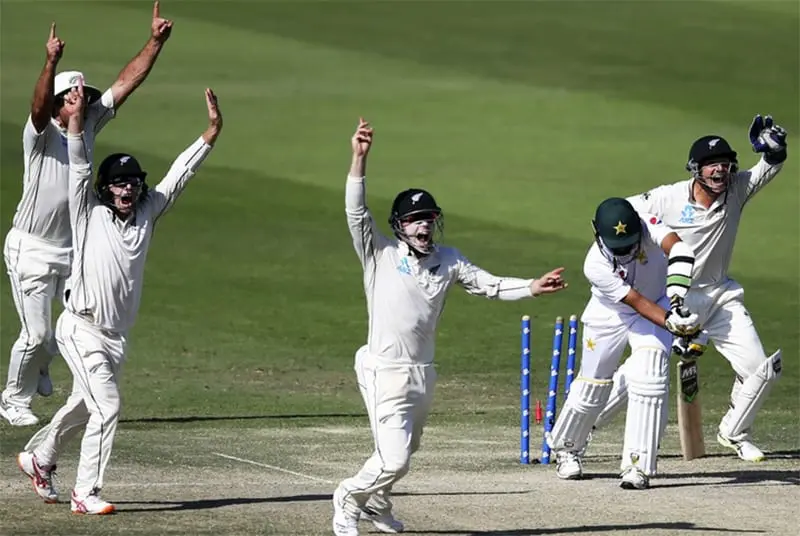New Zealand pulled off the seemingly-impossible against Pakistan on Monday, clinching one of the most famous wins in its test cricket history. Does the result bring up dark memories for punters?
Can the cricket world trust the Pakistan vs. New Zealand test result?

NEW Zealand pulled off the seemingly-impossible against Pakistan on Monday, clinching one of the most famous wins in its test cricket history.
Requiring 176 to win in the final innings on day four of the Abu Dhabi test at Sheikh Zayed Stadium, Pakistan looked to be coasting to victory at 3-130.
They had seven wickets in hand and 46 runs to win. In anyone’s language, it should have been a canter.
Then the collapse came.
Pakistan, as it has been known to do over the last decade, found a way to lose.
Babar Azam threw away his wicket with a suicidal run out, Pakistan captain Sarfraz Ahmed could only add a couple of runs before edging behind and the tail-end batsmen played with all the composure and responsibility you would see in a Twenty20 match.
Azhar Ali (65) threatened to steer the tail home, but as the game tightened up, New Zealand lifted its intensity and made things tough on the home side.
New Zealand spinner, Ajez Patel, on debut, was the hero, taking four of the last five wickets with an impressive spell on a deck that had provided an intriguing match.
With just four runs to win, Patel got past the defences of Ali and New Zealand had the closest winning margin of its 426-test history.
As the dust settles and the New Zealand team enjoys its victory, questions will be asked of Pakistan.
Questions that come from a dark, regrettable past.
BetOnline

$5,000
Get up to $250 in Free Bets with no strings attached, plus 100 Free Spins.
Can cricket fans trust the result of this Pakistan loss?
Let’s not sugar coat this.
Pakistan players have manipulated results in the past for personal benefit.
Since the International Cricket Council beefed up its anti-corruption investigations in the 1990s, 26 cricketers have been found guilty of corruption. Seven of those have been Pakistan players:
- Ata-ur-Rehman was banned for life after being found guilty of dealings with bookmakers in 2000.
- Saleem Malik captained his country in the late 1990s and was banned for life after being found guilty of offering bribes to players . He was the first international cricketer to ever be jailed — his ban was later lifted on appeal.
- Danish Kaneria burst on to the test scene as an exciting spinner in the early 2000s. He was found guilty of spot-fixing in 2009 in English County cricket and was banned for life.
- Perhaps most famously, in 2010 Pakistan captain Salman Butt, 19-year-old exciting fast bowler Mohammad Amir and veteran quick Mohammad Asif were all banned after being exposed for spot-fixing and conspiring to intentionally bowl no-balls in a test match against England at the behest of bookmakers. All three spent time in English prison. Only Mohammad Amir has returned to international cricket.
Pakistan is not alone in having cricketers found guilty of cheating. Seven South African cricketers have been given bans for corruption, most-famously former captain Hanse Cronje. Five Indians have received bans, as have cricketers from New Zealand, West Indies and Bangladesh.
But, most recently, it was the nature of Pakistan’s corruption that has left a lasting impression.
Footage of Pakistan captain Salman Butt taking money, coupled with glaring no-balls at the agreed-upon deliveries shocked the world and damaged the innocence of the sport.
Questions were asked then and continue to be asked:
Can the Pakistan cricketers be trusted when exorbitant illegal bookmaker money is on offer?
Does the Pakistan Cricket Board do enough to stamp out corruption?
Are there other cricketers out there fixing results and underperforming for money?
With every poor result, with every batting collapse, with every defeat snapped from the jaws of victory, people will have doubts. They will struggle to trust what they have seen.
While it’s hard to believe any Pakistan cricketer would be stupid enough to accept bribery after the debacle in 2010, many would have made the same assumption eight years ago.
While we believe the result on Monday afternoon was an honest, good-old-fashioned mental capitulation from a famously-inconsistent team, it’s impossible not to ask the question.
Especially while India fails to regulate sports betting, empowering the most powerful black-market illegal bookmaker industry in the world, spreading its tentacles across the world, offering enormous amounts of money to tempt young cricketers into enormous personal risk.
This is what corruption does and why there is an inherent selfishness that corruption requires from the individual.
It is not a risk that can only come back to bite one person.
They not only cheat themselves and their opponents, but their teammates, past, future and present, become tarred with that same brush.
How long will it be before people stop asking hushed questions every time Pakistan has a bizarre result? When will people learn to trust fully and whole-heartedly again?
Our advice: whether there is corruption or not, be very careful before you bet on Pakistan in any format of cricket.











